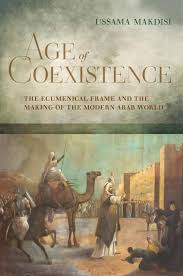Age of Coexistence: The Ecumenical Frame and the Making of the Modern Arab World – Ussama Makdisi

Author: Ussama Makdisi
Publisher: University of California Press
Year of Publication: 2019
Print Length: 312 pages
Genre: Non-Fiction / History, Non-Fiction / Religious Studies
Area: Ottoman Empire, Palestine / Israel, Saudi Arabia
People: Jews
Topic: Genocide, Imperialism, Modernity, Modernism, Modern, Pluralism
Today’s headlines paint the Middle East as a collection of war-torn countries and extremist groups consumed by sectarian rage. Ussama Makdisi’s Age of Coexistence reveals a hidden and hopeful story that counters this clichéd portrayal. It shows how a region rich with ethnic and religious diversity created a modern culture of coexistence amid Ottoman reformation, European colonialism, and the emergence of nationalism.
Moving from the nineteenth century to the present, this groundbreaking book explores, without denial or equivocation, the politics of pluralism during the Ottoman Empire and in the post-Ottoman Arab world. Rather than judging the Arab world as a place of age-old sectarian animosities, Age of Coexistence describes the forging of a complex system of coexistence, what Makdisi calls the “ecumenical frame.” He argues that new forms of antisectarian politics, and some of the most important examples of Muslim-Christian political collaboration, crystallized to make and define the modern Arab world.
Despite massive challenges and setbacks, and despite the persistence of colonialism and authoritarianism, this framework for coexistence has endured for nearly a century. It is a reminder that religious diversity does not automatically lead to sectarianism. Instead, as Makdisi demonstrates, people of different faiths, but not necessarily of different political outlooks, have consistently tried to build modern societies that transcend religious and sectarian differences.
Table of Contents
List of Maps
Acknowledgments
Note on Transliteration
Introduction: The Ecumenical Frame
PART I
1. Religious Difference in an Imperial Age
2. The Crubicle of Sectarian Violance
3. Coexistence in an Age of Genocide
PART II
4. Colonial Pluralism
5. Sectarianism and Antisectarianism in the Post-Ottoman Arab World
6. Breaking the Ecumenical Frame: Arab and Jew in Palestine
Epilogue
Notes
Works Cited
Index

Ussama Makdisi is Professor of History and Chancellor’s Chair at the University of California Berkeley. He was previously Professor of History and the first holder of the Arab-American Educational Foundation Chair of Arab Studies at Rice University in Houston. During AY 2019-2020, Professor Makdisi was a Visiting Professor at the University of California at Berkeley in the Department of History. In 2012-2013, Makdisi was an invited Resident Fellow at the Wissenschaftskolleg zu Berlin (Institute for Advanced Study, Berlin). In April 2009, the Carnegie Corporation named Makdisi a 2009 Carnegie Scholar as part of its effort to promote original scholarship regarding Muslim societies and communities, both in the United States and abroad. Makdisi was awarded the Berlin Prize and spent the Spring 2018 semester as a Fellow at the American Academy of Berlin.
Source: https://history.berkeley.edu/people/faculty/current/ussama-makdisi
More from Ussama Makdisi in this library, click here.
